Teleostei (teleosts) >
Gadiformes (Cods) >
Macrouridae (Grenadiers or rattails)
Etymology: Kumba: Named for the Marine Biological Association of the United Kingdom, whose research vessel Sarsia dredged the type species.
Eponymy: KUMBA is an anagram of the initial letters of the Marine Biological Association of the United Kingdom. (Ref. 128868), visit book page.
Environment: milieu / climate zone / depth range / distribution range
Ecology
Marine; bathypelagic; depth range 550 - 710 m (Ref. 11651). Deep-water
Northwest Pacific: southern Japan and southwestern Taiwan.
Size / Weight / Age
Maturity: Lm ? range ? - ? cm
Max length : 17.6 cm TL male/unsexed; (Ref. 11651)
Dorsal spines (total): 2. Firm head not inflated; head pores present. Dorsally scaleless snout extend only to the lateral nasal angles. Orbit diameter 36-43% of head length; snout (1.25-1.5) and interorbital (1.4-1.7), much shorter than orbit. Barbel 21-33% HL. ADW and PDW lens-like and widely separated. Three small black pigmented areas near the mid-length of the anal fin base. 40-52 pyloric caeca. 1D II,10 (Ref. 11651).
Body shape (shape guide): elongated.
Life cycle and mating behavior
Maturity | Reproduction | Spawning | Eggs | Fecundity | Larvae
Iwamoto, T. and Y.I. Sazonov, 1994. Revision of the genus Kumba (Pisces, Gadiformes, Macrouridae), with the description of three new species. Proc. Calif. Acad. Sci. 48(11):221-237. (Ref. 11651)
IUCN Red List Status (Ref. 130435: Version 2025-1)
Threat to humans
Harmless
Human uses
Tools
Special reports
Download XML
Internet sources
Estimates based on models
Preferred temperature (Ref.
123201): 7.2 - 9.9, mean 7.4 °C (based on 7 cells).
Phylogenetic diversity index (Ref.
82804): PD
50 = 0.5039 [Uniqueness, from 0.5 = low to 2.0 = high].
Bayesian length-weight: a=0.00214 (0.00109 - 0.00421), b=3.20 (3.03 - 3.37), in cm total length, based on LWR estimates for this (Sub)family-body shape (Ref.
93245).
Trophic level (Ref.
69278): 3.4 ±0.4 se; based on size and trophs of closest relatives
Resilience (Ref.
120179): Medium, minimum population doubling time 1.4 - 4.4 years (Preliminary K or Fecundity.).
Fishing Vulnerability (Ref.
59153): Low vulnerability (10 of 100).
🛈
